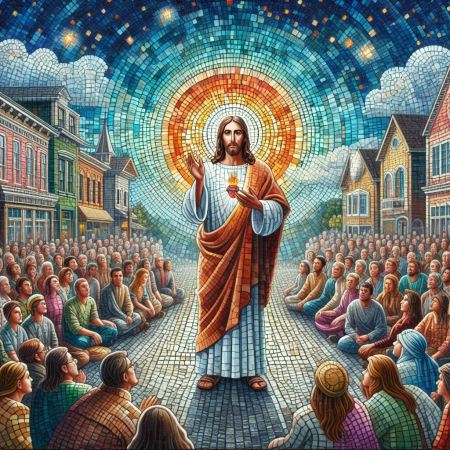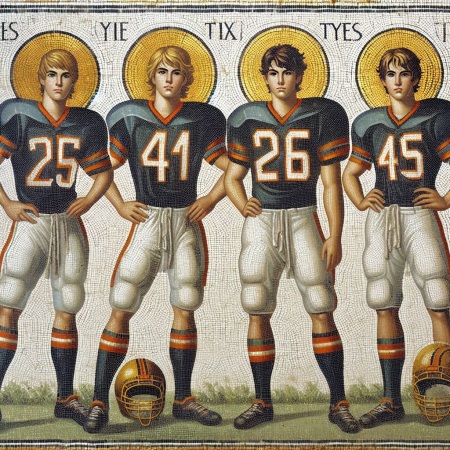By Fr. Victor Feltes

We say their names at every Sunday Mass. We recall them at the start of every Rosary. They are the only two, non-divine persons referred to by name in the Nicene and Apostles’ Creeds. They are the Virgin Mary and Pontius Pilate.
“For us men and for our salvation he came down from heaven, and by the Holy Spirit was incarnate of the Virgin Mary, and became man. For our sake he was crucified under Pontius Pilate, he suffered death and was buried, and rose again on the third day in accordance with the Scriptures.”
Consider how many other figures from salvation history could have been justifiably cited in these creeds; from Adam and Eve to Peter and Paul. Yet only Mary and Pilate are mentioned. Why? At the heart of human history, where on our timeline B.C. becomes A.D., the eternal Son of God became man. Our Savior lives not “Once upon a time.” He is born, suffers, dies, and rises in flesh and blood reality. Mary, the woman who gave him life and Pilate, the man who put him to death, ground Jesus Christ, our Gospel, and our salvation in real human history.
Mary and Pilate are not merely historical figures but also archetypes. They represent two patterns, two types of people we can learn from: Mary, whose good example we should follow, and Pilate, whose bad example we should avoid. Recounting the gospel accounts of the Roman trial during Christ’s Passion, let us compare, contrast, and profit from contemplating Governor Pontius Pilate and the Blessed Virgin Mary. Consider to these reflections for what lessons you can gain.
On Good Friday morning, all the chief priests and the elders of the people took counsel against Jesus to put him to death. They bound him, led him away, and handed him over to Pilate, the governor.
Confronted with Jesus the Christ, all four Gospels record Pilate asking this pivotal question: “Are you the king of the Jews?” Jesus responds affirmatively that it is so. At the Annunciation, after greeting and reassuring Mary, St. Gabriel the Archangel said, “Behold, you will conceive in your womb and bear a son, and you shall name him Jesus. He will be great and will be called Son of the Most High, and the Lord God will give him the throne of David his father, and he will rule over the house of Jacob forever, and of his Kingdom there will be no end.” When the Virgin Mary is confronted with Jesus the Christ, the king of the Jews, she asks a clarifying question too. She said to the angel, “How can this be, since I have no relations with a man?”
Pilate and Mary have this in common: they both ask serious questions about Jesus Christ seeking to better understand. It is good for us ask honest questions about Jesus Christ, about God, or about our Catholic Faith. Jesus says, “Whoever asks, receives,” and “whoever seeks, finds.” But when we receive our answer, when we find the truth, how will we respond to the Word? Here we see a difference between Mary and Pilate.
Pilate then addressed the chief priests and the crowds, “I find this man not guilty.” But they were adamant and said, “He is inciting the people with his teaching throughout all Judea, from Galilee where he began even to here.” On hearing this, Pilate asked if the man was a Galilean; and upon learning that he was under Herod’s jurisdiction, he sent him to Herod who was in Jerusalem at that time.
After questioning Jesus, Pilate finds him not guilty of any crime. Realize that Pontius Pilate does not want to kill Jesus; however, the governor would be very glad to be rid of him. Jesus has done nothing worthy of punishment, but Pilate wants to keep those who hate their Roman governor at bay while avoiding making new enemies. He declares Christ not guilty but refuses to set him free. As soon as Pilate sees an opportunity to pawn off Jesus the Nazarene to King Herod across town, he does so. Rather than doing something brave and good, Pilate punts. In contrast, at the Annunciation, when Mary is first presented with Jesus Christ, she does not ask the angel if someone else could be given this task. She does not refuse to do something righteous and courageous. Mary lovingly receives Christ through her “fiat,” saying, “Let it be done to me according to your will.”
King Herod had been eager to meet Jesus and questioned him. Yet the Lord gave him no reply, even as the chief priests and scribes stood by accusing him harshly. Herod does not hold Jesus in prison or behead him as he did with St. John the Baptist. Instead, having grown tired of Jesus, Herod sends Jesus back to Pilate dressed in resplendent garb like a king as a joke. Even though Herod and Pilate had previously been enemies, St. Luke records that the two became friends that day. This shows you that neither ruler saw Jesus as much of a threat. The worldly, like Pilate, will judge by appearances, but the godly, like Mary, can be granted the gift to see deeper realities. When Jesus gets brought back to Pilate’s praetorium doorstep, the governor must deal with this problem anew.
Pilate said to him, “Then you are a king?” Jesus answered, “You say I am a king. For this I was born and for this I came into the world, to testify to the truth. Everyone who belongs to the truth listens to my voice.” And Pilate said to him, “What is truth?” When he had said this, he again went out to the Jews and said to them, “I find no guilt in him.”
Our styles and technologies have changed since ancient times, generations and great empires have come and gone, but human nature remains the same. Pilate is a moral relativist, a postmodern man in the ancient world. “What is truth” he scoffs at Jesus, turns his back on Truth Incarnate, and walks away. He thinks that truth cannot be known, except for those “truths” which we choose for ourselves or impose upon others.
Later in the Passion, Pilate provokes Jesus’ enemies with the sign he orders to be posted above Jesus’ head on the Cross. When the chief priests complain to Pilate saying, “Do not write ‘The King of the Jews,’ but that “He said ‘I am the King of the Jews.’” Pilate replies dismissively, “What I have written, I have written.” Pilate does not believe in truth but serves the truth despite himself. The Virgin Mary believes in truth, belongs to the truth, and cooperates with the truth: “Let it be done to me according to your word.” Jesus says everyone who belongs to the truth listens to his voice.
Pilate knows worldly wisdom, he is clever and cunning.
Mary knows God’s wisdom, and she is truly wise.
Pilate seeks the glory of men.
Mary seeks the glory of God.
Pilate, despite all his worldly power, is ruled by fear.
Mary, despite her natural weakness, is freed from fear.
Pilate is the secular Man of the World.
Mary is the devoted Disciple of Christ.
While Governor Pilate was still seated on the judge’s bench, his wife sent him a message, “Have nothing to do with that righteous man. I suffered much in a dream today because of him.”
This is another similarity between Pilate and Mary: both of their spouses experienced prophetic dreams. St. Matthew recounts how Mary’s husband, St. Joseph, had at least four inspired dreams. One dream reassured him to take Mary into his home, one told him to flee with his family into Egypt, another later told him to return them to the land of Israel, and one more dream which led him to resettle them in Nazareth. Matthew likewise records the dream of Pontius Pilate’s wife, and her urging her husband to “have nothing to do with that righteous man.” Mary listened to her spouse and was blessed. Pilate did not heed his wife and walked into disaster. God gave spouses to each other as helpmates, and the Lord sometimes gives authentic mystical experiences to guide us. Now spouses are not always right and some dreams are just dreams—some fears and some visions are merely imagined. But it is wise not to dismiss out of hand the input of your helpmate or the possibility of mystical experiences from God.
The Jews answered Pilate, “We have a law, and according to that law he ought to die, because he made himself the Son of God.” Now when Pilate heard this statement, he became even more afraid and went back into the praetorium and said to Jesus, “Where are you from?” Jesus did not answer him. So Pilate said to him, “Do you not speak to me? Do you not know that I have power to release you and I have power to crucify you?” Jesus answered him, “You would have no power over me if it had not been given to you from above. For this reason the one who handed me over to you has the greater sin.”
Both Mary and Pilate were entrusted with power over Jesus from above. After Mary and Joseph found the boy Jesus at the temple, “He went down with them and came to Nazareth, and was obedient to them.” And Jesus told Pilate, “You would have no power over me if it had not been given to you from above.” When the Son of Man comes in his glory and the sheep are separated from the goats, we will be judged in part on whether we did what good was in our power: “Amen, I say to you, what you did [or did] not do for one of these least ones, you [did or] did not do for me.” Jesus says, “Much will be required of the person entrusted with much, and still more will be demanded of the person entrusted with more.” Who and what has been entrusted to you? How are you using your power?
The gospels show how Pilate knows that Jesus Christ is innocent, or at least believes he poses no real threat to society, yet Pilate is willing to have this innocent man whipped and even killed when that becomes the most expedient thing to do.
When Pilate saw that he was not succeeding at all, but that a riot was breaking out instead, he took water and washed his hands in the sight of the crowd, saying, “I am innocent of this man’s blood. Look to it yourselves.” … Then he handed him over to be crucified.
Governor Pilate washes his hands, as if he had no hand in Jesus’ death. He washes his hands as a sign to say ‘my hands are clean in this injustice.’ Yet all our sins caused Jesus Christ to die. Though Mother Mary was free from sin and her hands were truly clean, Christ’s sacrifice was for her too. The First Letter of St. John says if you or I say, “‘We are without sin,’ we deceive ourselves, and the truth is not in us. If we acknowledge our sins, he is faithful and just and will forgive our sins and cleanse us from every wrongdoing. If we say, ‘We have not sinned,’ we make him a liar, and his word is not in us. If we claim to be without sin, we deceive ourselves and the truth is not in us.” If we go looking for excuses for our sinful behavior, we will always find them. Instead, let us repent of sin and live in the truth.
Pilate had an inscription written and put on the cross. It read, “Jesus the Nazorean, the King of the Jews.” Now many of the Jews read this inscription, because the place where Jesus was crucified was near the city; and it was written in Hebrew, Latin, and Greek.
Sometimes you will see this titulus sign depicted at the top of crucifixes featuring the letters “INRI.” This is an abbreviation for the Latin phrase “Iesus Nazarenus, Rex Iudaeorum,” or “Jesus the Nazarene, King of the Jews.” It was the Romans’ custom to display upon condemned persons’ crosses the crime for which they were being executed. As I said before, through this inscription, Pilate was antagonizing or trolling the Jewish religious leaders. Pilate does not truly believe that Jesus is a king, the Jewish Messiah or the Christ. Yet he accurately identifies the reason for Jesus Christ’s death: Jesus was killed for being who he was, he was killed for being the Christ. St. John’s Gospel says, “He came to what was his own, but his own people did not accept him. But to those who did accept him he gave power to become children of God, to those who believe in his name.”
On Good Friday, Pilate wrote his sign’s message in three common languages of that day for all the world to see. In the centuries since, when Mary has appeared in various apparitions around the world, she speaks in the native tongue of the visionaries in order for her messages pointing to her Son to be better understood by all. God never directly wills evil. Sins are something which we freely choose. But God writes straight with crooked lines. In the end, all of us, both God’s friends and his enemies, will have been agents of God’s will. Some, like Mary, will cooperate with him willingly. Others, like Pilate, will serve him unwittingly.
Jesus said, “Amen, I say to you that you who have followed me, in the new age, when the Son of Man is seated on his throne of glory, will yourselves sit on twelve thrones, judging the twelve tribes of Israel. And everyone who has given up houses or brothers or sisters or father or mother or children or lands for the sake of my name will receive a hundred times more, and will inherit eternal life. But many who are first will be last, and the last will be first.”
So where are Pilate and Mary now?
The last became first and the first became last.
She who wept, now laughs.
He who laughed, now weeps.
He was Roman governor of Judea.
She is now queen of heaven and earth.
He took root in the desert for self-glory, but was barren and uprooted.
She was planted beside the flowing waters of her Son, and endured, bore fruit, and shares in God’s glory.
When Jesus saw his mother and the disciple there whom he loved, he said to his mother, “Woman, behold, your son.” Then he said to the disciple, “Behold, your mother.” And from that hour the disciple took her into his home.
Mary and Pilate: the one who gives Christ life and the one who puts him to death, the one who serves the Lord and the one who serves himself, the faithful one and the faithless one. Are we Pilate or are we Mary? At different times, in different ways, we may be like one or the other. During this Lenten season, let us examine and discern who we are. “How and when am I like Pilate? Where and how am I like Mary?” May we reject his bad example and follow her good leading to draw closer to Jesus Christ and share in his rewards and glory.














